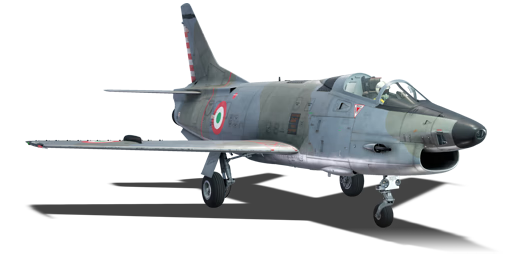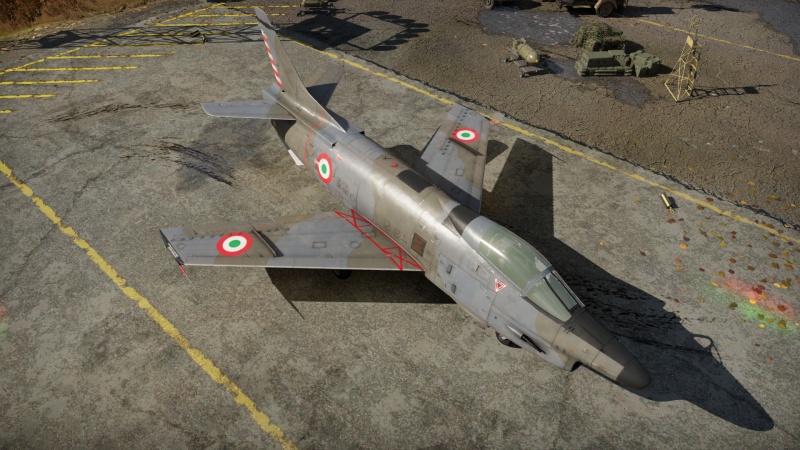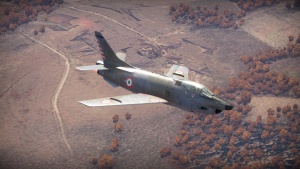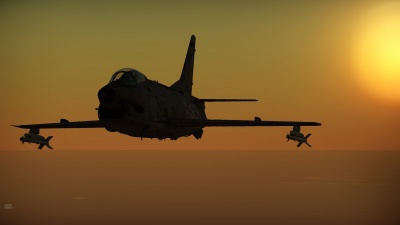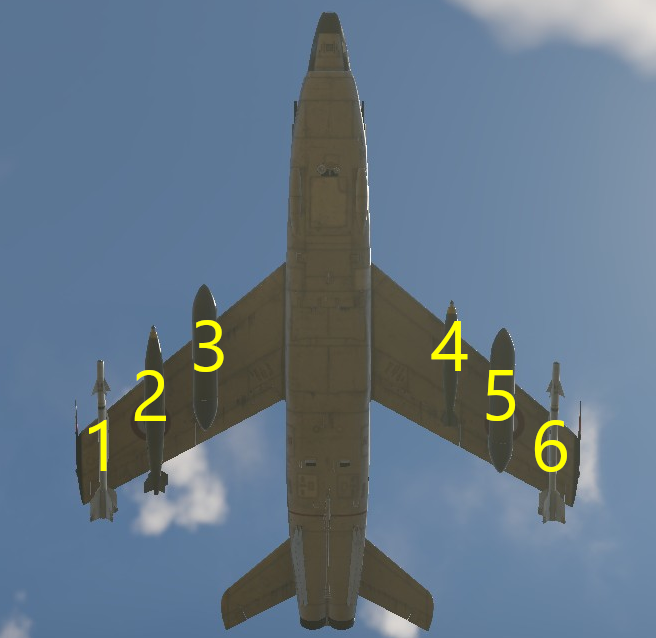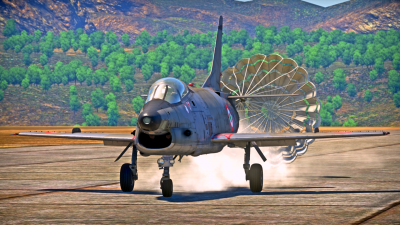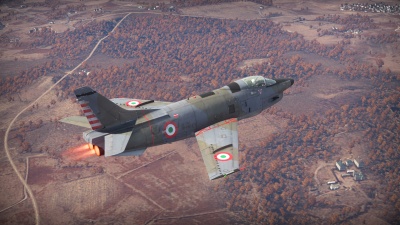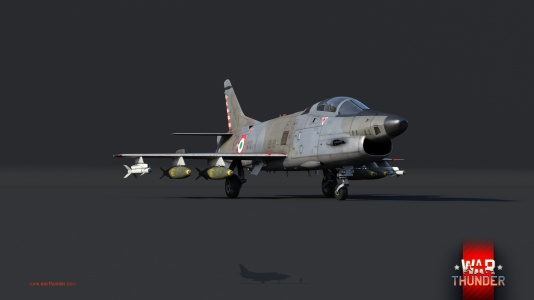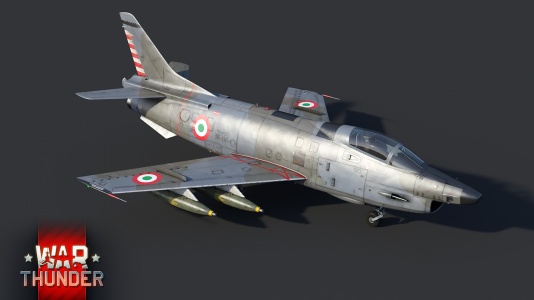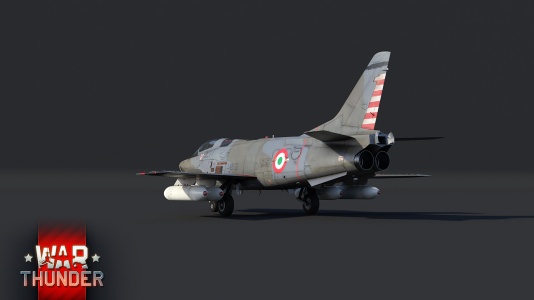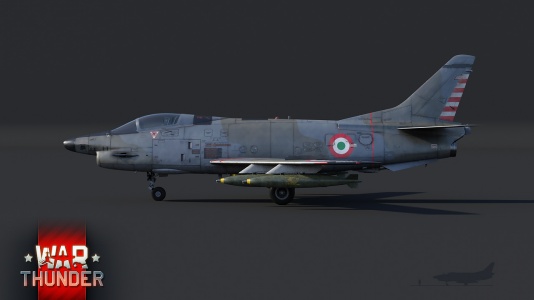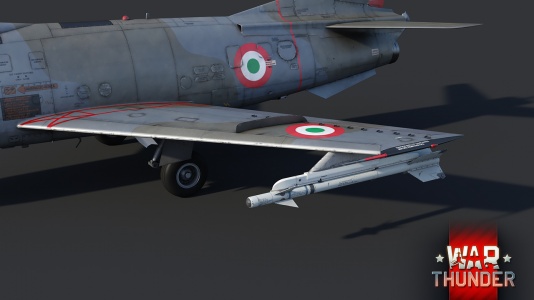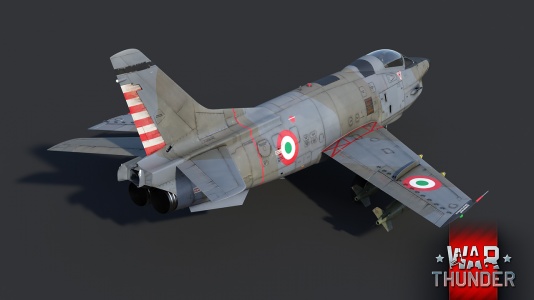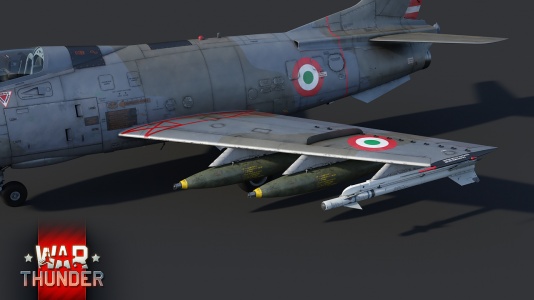Difference between revisions of "G.91 YS"
m (Added some pros and cons) (Tag: Visual edit) |
(→Description) |
||
| (15 intermediate revisions by 9 users not shown) | |||
| Line 1: | Line 1: | ||
{{About | {{About | ||
| about = Italian jet fighter '''{{PAGENAME}}''' | | about = Italian jet fighter '''{{PAGENAME}}''' | ||
| − | | usage = other | + | | usage = other versions |
| link = G.91 (Family) | | link = G.91 (Family) | ||
}} | }} | ||
| Line 11: | Line 11: | ||
== Description == | == Description == | ||
<!-- ''In the description, the first part should be about the history of and the creation and combat usage of the aircraft, as well as its key features. In the second part, tell the reader about the aircraft in the game. Insert a screenshot of the vehicle, so that if the novice player does not remember the vehicle by name, he will immediately understand what kind of vehicle the article is talking about.'' --> | <!-- ''In the description, the first part should be about the history of and the creation and combat usage of the aircraft, as well as its key features. In the second part, tell the reader about the aircraft in the game. Insert a screenshot of the vehicle, so that if the novice player does not remember the vehicle by name, he will immediately understand what kind of vehicle the article is talking about.'' --> | ||
| − | The '''{{Specs|name}}''' | + | The '''{{Specs|name}}''' was based in the earlier G.91 Y, which was a complete redesign of the G.91 series of aircraft, going from a small and light airframe to a heavier and more capable one, with two afterburning engines, a longer range, and a bigger payload for ground attack missions. The G.91 YS was a version of this fighter developed for Switzerland, the main difference was slightly modified avionics and the addition of more modern loadouts, such as AIM-9 Sidewinders. Though the country was interested in acquiring the G.91, the purchase was never completed. |
| − | + | It was introduced in [[Update 1.87 "Locked On"]]. In similar fashion to the French [[Super Mystere B2]], the {{PAGENAME}} was outfitted with dual 30 mm DEFA autocannons in the cheeks of the forward fuselage. Also in the same vein, the {{PAGENAME}} was built to be a multi-role fighter as a fighter-interceptor or a fighter-bomber. Due to the increased power of the dual engines, this fighter when acting in a bomber role has the ability to carry up to 4,000 lbs of bombs, though configurations as low as 1,000 lbs is available. FFAR Mighty Mouse unguided rockets are another good option for taking out softer ground targets, since they have the potential to destroy a higher number of enemies in the hands of a skilled pilot. For air combat, the G.91 YS lacks countermeasures but compensates this with a very good flight performance, however it has a mediocre top speed, in a BR when most fighters are already supersonic; keep your speed high at all times or else you might become vulnerable to missiles and fast interceptors like the MiG-21s and F-104s that start to be very common. | |
| − | |||
| − | In similar fashion to the | ||
| − | |||
| − | |||
| − | |||
| − | |||
== General info == | == General info == | ||
| Line 25: | Line 19: | ||
{{Specs-Avia-Flight}} | {{Specs-Avia-Flight}} | ||
<!-- ''Describe how the aircraft behaves in the air. Speed, manoeuvrability, acceleration and allowable loads - these are the most important characteristics of the vehicle.'' --> | <!-- ''Describe how the aircraft behaves in the air. Speed, manoeuvrability, acceleration and allowable loads - these are the most important characteristics of the vehicle.'' --> | ||
| − | The {{PAGENAME}} is a very good Boom & Zoom fighter, the only issue is confronting other jets with afterburner capabilities which make your Boom & Zoom attempt more difficult. The | + | [[File:G91YS Jermster 91 001.jpg|300px|thumb|right|A bird's eye view of a {{PAGENAME}} fighter.]] |
| − | + | The {{PAGENAME}} is a very good Boom & Zoom fighter, the only issue is confronting other jets with afterburner capabilities which make your Boom & Zoom attempt more difficult. The YS has a lower turn speed than the other G.91s (swapped for acceleration and a little bit more speed) it is also two high power engines, making it possible to return to base on one engine or even fight like that if you want. Sadly the G.91 isn't supersonic but it can get close in a steep dive, making it one of the best trans-sonic jets! | |
| − | + | ||
| − | {| class="wikitable" style="text-align:center" | + | {| class="wikitable" style="text-align:center" width="70%" |
! rowspan="2" | Characteristics | ! rowspan="2" | Characteristics | ||
| − | ! colspan="2" | Max Speed<br>(km/h at 0 m - | + | ! colspan="2" | Max Speed<br>(km/h at 0 m - sea level) |
| − | ! rowspan="2" | Max altitude<br>( | + | ! rowspan="2" | Max altitude<br>(metres) |
! colspan="2" | Turn time<br>(seconds) | ! colspan="2" | Turn time<br>(seconds) | ||
| − | ! colspan="2" | Rate of climb<br>( | + | ! colspan="2" | Rate of climb<br>(metres/second) |
| − | ! rowspan="2" | Take-off run<br>( | + | ! rowspan="2" | Take-off run<br>(metres) |
|- | |- | ||
! AB !! RB !! AB !! RB !! AB !! RB | ! AB !! RB !! AB !! RB !! AB !! RB | ||
| Line 42: | Line 36: | ||
|- | |- | ||
! Upgraded | ! Upgraded | ||
| − | | 1,131 || 1,123 || 28.6 || 29.0 || 91.8 || 75 | + | | 1,131 || 1,123 || 28.6 || 29.0 || 91.8 || 75.0 |
|- | |- | ||
|} | |} | ||
==== Details ==== | ==== Details ==== | ||
| − | {| class="wikitable" style="text-align:center" | + | {| class="wikitable" style="text-align:center" width="50%" |
|- | |- | ||
! colspan="6" | Features | ! colspan="6" | Features | ||
| Line 57: | Line 51: | ||
|} | |} | ||
| − | {| class="wikitable" style="text-align:center" | + | {| class="wikitable" style="text-align:center" width="50%" |
|- | |- | ||
! colspan="7" | Limits | ! colspan="7" | Limits | ||
| Line 68: | Line 62: | ||
! Combat !! Take-off !! Landing !! + !! - | ! Combat !! Take-off !! Landing !! + !! - | ||
|- | |- | ||
| − | | {{Specs|destruction|body}} || {{Specs|destruction|gear}} || | + | | {{Specs|destruction|body}} || {{Specs|destruction|gear}} || 592 || 556 || 371 || ~11 || ~4 |
|- | |- | ||
|} | |} | ||
| Line 125: | Line 119: | ||
Like many later generation jet fighters (those built in the 1960s-70s) the {{PAGENAME}} traded armour for greater ordnance carrying capacity. Though not without all armour, the canopy windshield has an effective thickness of 94 mm to protect the pilot in the event of a head-on attack. Though the 6.5 mm of steel behind the pilot's seat seem to be on the thin side, bullets coming in from that direction will need to pass through the engine first. If the pilot is going to be hit by bullets it will most likely be through side angle shots or from above. | Like many later generation jet fighters (those built in the 1960s-70s) the {{PAGENAME}} traded armour for greater ordnance carrying capacity. Though not without all armour, the canopy windshield has an effective thickness of 94 mm to protect the pilot in the event of a head-on attack. Though the 6.5 mm of steel behind the pilot's seat seem to be on the thin side, bullets coming in from that direction will need to pass through the engine first. If the pilot is going to be hit by bullets it will most likely be through side angle shots or from above. | ||
| − | [[File:G91YS AgressiveRecon 001.jpg|700px|thumb|center|Aerial shot of a | + | [[File:G91YS AgressiveRecon 001.jpg|700px|thumb|center|Aerial shot of a {{PAGENAME}} at altitude.]] |
=== Modifications and economy === | === Modifications and economy === | ||
| Line 132: | Line 126: | ||
== Armaments == | == Armaments == | ||
{{Specs-Avia-Armaments}} | {{Specs-Avia-Armaments}} | ||
| + | {| class="wikitable" style="text-align:center" | ||
| + | |- | ||
| + | ! colspan="4" | [[Ballistic Computer]] | ||
| + | |- | ||
| + | ! CCIP (Guns) !! CCIP (Rockets) !! CCIP (Bombs) !! CCRP (Bombs) | ||
| + | |- | ||
| + | | {{Tick}} || {{Tick}} || {{Tick}} || {{Cross}} | ||
| + | |- | ||
| + | |} | ||
=== Offensive armament === | === Offensive armament === | ||
| + | [[File:G91YS CrazyJow 001.jpg|400px|thumb|right|'''{{PAGENAME}}''' fighter with the sun setting behind it.]] | ||
{{Specs-Avia-Offensive}} | {{Specs-Avia-Offensive}} | ||
<!-- ''Describe the offensive armament of the aircraft, if any. Describe how effective the cannons and machine guns are in a battle, and also what belts or drums are better to use. If there is no offensive weaponry, delete this subsection.'' --> | <!-- ''Describe the offensive armament of the aircraft, if any. Describe how effective the cannons and machine guns are in a battle, and also what belts or drums are better to use. If there is no offensive weaponry, delete this subsection.'' --> | ||
{{main|DEFA 552 (30 mm)}} | {{main|DEFA 552 (30 mm)}} | ||
| − | |||
The '''''{{PAGENAME}}''''' is armed with: | The '''''{{PAGENAME}}''''' is armed with: | ||
| Line 145: | Line 148: | ||
{{Specs-Avia-Suspended}} | {{Specs-Avia-Suspended}} | ||
<!-- ''Describe the aircraft's suspended armament: additional cannons under the wings, bombs, rockets and torpedoes. This section is especially important for bombers and attackers. If there is no suspended weaponry remove this subsection.'' --> | <!-- ''Describe the aircraft's suspended armament: additional cannons under the wings, bombs, rockets and torpedoes. This section is especially important for bombers and attackers. If there is no suspended weaponry remove this subsection.'' --> | ||
| − | |||
The '''''{{PAGENAME}}''''' can be outfitted with the following ordnance: | The '''''{{PAGENAME}}''''' can be outfitted with the following ordnance: | ||
| + | |||
| + | {| class="wikitable" style="text-align:center" width="100%" | ||
| + | |- | ||
| + | ! !! width="7%" | 1 !! width="7%" | 2 !! width="7%" | 3 !! width="7%" | 4 !! width="7%" | 5 !! width="7%" | 6 | ||
| + | | rowspan="9" width="30%" | <div class="ttx-image">[[File:Hardpoints_{{PAGENAME}}.png]]</div> | ||
| + | |- | ||
| + | ! [[LDGP Mk 82 (500 lb)|500 lb LDGP Mk 82]] bombs | ||
| + | | || 1 || 1 || 1 || 1 || | ||
| + | |- | ||
| + | ! [[Mk 82 Snakeye (500 lb)|500 lb Mk 82 Snakeye]] bombs | ||
| + | | || 1 || 1 || 1 || 1 || | ||
| + | |- | ||
| + | ! [[LDGP Mk 83 (1,000 lb)|1,000 lb LDGP Mk 83]] bombs | ||
| + | | || 1 || 1 || 1 || 1 || | ||
| + | |- | ||
| + | ! [[Aerea 559G1 incendiary]] bombs | ||
| + | | || || 1 || 1 || || | ||
| + | |- | ||
| + | ! [[FFAR Mighty Mouse]] rockets | ||
| + | | || 19 || 19 || 19 || 19 || | ||
| + | |- | ||
| + | ! [[Zuni Mk32 Mod 0 ATAP]] rockets | ||
| + | | || 4 || 4 || 4 || 4 || | ||
| + | |- | ||
| + | ! [[AIM-9B Sidewinder]] missiles | ||
| + | | 1 || || || || || 1 | ||
| + | |- | ||
| + | | colspan="7" | Maximum permissible loadout weight: 1,815 kg<br>Maximum permissible wing load: 1,000 kg<br>Maximum permissible weight imbalance: 800 kg | ||
| + | |- | ||
| + | |} | ||
| + | |||
| + | {{Navigation-Start|Default weapon presets}} | ||
| + | {{Navigation-First-Simple-Line}} | ||
* Without load | * Without load | ||
* 2 x 500 lb LDGP Mk 82 bombs (1,000 lb total) | * 2 x 500 lb LDGP Mk 82 bombs (1,000 lb total) | ||
* 4 x 500 lb LDGP Mk 82 bombs (2,000 lb total) | * 4 x 500 lb LDGP Mk 82 bombs (2,000 lb total) | ||
| + | * 4 x 500 lb Mk 82 Snakeye bombs (2,000 lb total) | ||
* 2 x 1,000 lb LDGP Mk 83 bombs (2,000 lb total) | * 2 x 1,000 lb LDGP Mk 83 bombs (2,000 lb total) | ||
* 4 x 1,000 lb LDGP Mk 83 bombs (4,000 lb total) | * 4 x 1,000 lb LDGP Mk 83 bombs (4,000 lb total) | ||
* 76 x FFAR Mighty Mouse rockets | * 76 x FFAR Mighty Mouse rockets | ||
| − | * | + | * 16 x Zuni Mk32 Mod 0 ATAP rockets |
| − | * | + | * 2 x AIM-9B Sidewinder missiles |
| − | * | + | * 2 x Aerea 559G1 incendiary bombs |
| − | + | {{Navigation-End}} | |
| − | |||
| − | |||
== Usage in battles == | == Usage in battles == | ||
<!-- ''Describe the tactics of playing in the aircraft, the features of using aircraft in a team and advice on tactics. Refrain from creating a "guide" - do not impose a single point of view, but instead, give the reader food for thought. Examine the most dangerous enemies and give recommendations on fighting them. If necessary, note the specifics of the game in different modes (AB, RB, SB).'' --> | <!-- ''Describe the tactics of playing in the aircraft, the features of using aircraft in a team and advice on tactics. Refrain from creating a "guide" - do not impose a single point of view, but instead, give the reader food for thought. Examine the most dangerous enemies and give recommendations on fighting them. If necessary, note the specifics of the game in different modes (AB, RB, SB).'' --> | ||
| − | The YS has a lot of power and energy potential, keep that in mind before going into battle. To add to this fighters punch, it also utilises AIM 9B missiles and in capable hands, this fighter can be a monster on the battlefield. The YS also has the capability of mounting 76 x FFAR Mighty Mouse rockets which provide the potential of low-altitude Boom & Zooming on trucks, anti-aircraft artillery, light tanks and even enemy fighters attempting an airfield capture, though this does not come without a cost. When dropping in low on ground targets, the fighter sacrifices its speed and manoeuvrability for that | + | The G.91 YS has a lot of power and energy potential, keep that in mind before going into battle. To add to this fighters punch, it also utilises AIM 9B missiles and in capable hands, this fighter can be a monster on the battlefield. The YS also has the capability of mounting 76 x FFAR Mighty Mouse rockets which provide the potential of low-altitude Boom & Zooming on trucks, anti-aircraft artillery, light tanks and even enemy fighters attempting an airfield capture, though this does not come without a cost. When dropping in low on ground targets, the fighter sacrifices its speed and manoeuvrability for that ordnance. The YS also can outfit a few bombs so the YS can then be used as a base bomber following up by attacking enemy fighters, but even still it isn't always reliable and can be easily intercepted from any other supersonic fighter jets patrolling the area. |
| − | Your biggest threats will be F- | + | Your biggest threats will be F-4Cs, MiG-19S/PT, F-100D, Mitsubishi T2, J-6A, J-7II, Hunter F.6, mainly because they have superior speed and ordnance. The Hunter is probably the best-matched jet to the {{PAGENAME}}. The only top tier jet which should not be too much of a pain is the Super Mystere B2, and F-86K because they have limited speed and slow acceleration compared and will never win in a vertical climb against the {{PAGENAME}}. |
=== Pros and cons === | === Pros and cons === | ||
<!-- ''Summarise and briefly evaluate the vehicle in terms of its characteristics and combat effectiveness. Mark its pros and cons in the bulleted list. Try not to use more than 6 points for each of the characteristics. Avoid using categorical definitions such as "bad", "good" and the like - use substitutions with softer forms such as "inadequate" and "effective".'' --> | <!-- ''Summarise and briefly evaluate the vehicle in terms of its characteristics and combat effectiveness. Mark its pros and cons in the bulleted list. Try not to use more than 6 points for each of the characteristics. Avoid using categorical definitions such as "bad", "good" and the like - use substitutions with softer forms such as "inadequate" and "effective".'' --> | ||
| − | [[File:G91YS easterly0815 001.png |400px|thumb|right| | + | [[File:G91YS easterly0815 001.png |400px|thumb|right|{{PAGENAME}} popping its braking parachute upon landing.]] |
'''Pros:''' | '''Pros:''' | ||
* Excellent acceleration and roll speed | * Excellent acceleration and roll speed | ||
| − | * Able to carry | + | * Able to carry air-to-air missiles |
* Wide variety of payload options | * Wide variety of payload options | ||
* High rate of climb | * High rate of climb | ||
| Line 184: | Line 218: | ||
* Slower than most planes it will face | * Slower than most planes it will face | ||
* Limited ammo | * Limited ammo | ||
| − | * Slower turn rate compared to earlier G. | + | * Slower turn rate compared to earlier G.91s |
| − | |||
* Flaps and landing gear are prone to ripping off | * Flaps and landing gear are prone to ripping off | ||
* New booster module is a must to research in order to avoid crashing during a very fast and low-level dive | * New booster module is a must to research in order to avoid crashing during a very fast and low-level dive | ||
| − | + | * AIM-9Bs have a poorer performance other air-to-air missiles at this BR | |
| − | + | * No countemeasures | |
== History == | == History == | ||
<!-- ''Describe the history of the creation and combat usage of the aircraft in more detail than in the introduction. If the historical reference turns out to be too long, take it to a separate article, taking a link to the article about the vehicle and adding a block "/History" (example: <nowiki>https://wiki.warthunder.com/(Vehicle-name)/History</nowiki>) and add a link to it here using the <code>main</code> template. Be sure to reference text and sources by using <code><nowiki><ref></ref></nowiki></code>, as well as adding them at the end of the article with <code><nowiki><references /></nowiki></code>. This section may also include the vehicle's dev blog entry (if applicable) and the in-game encyclopedia description (under <code><nowiki>=== In-game description ===</nowiki></code>, also if applicable).'' --> | <!-- ''Describe the history of the creation and combat usage of the aircraft in more detail than in the introduction. If the historical reference turns out to be too long, take it to a separate article, taking a link to the article about the vehicle and adding a block "/History" (example: <nowiki>https://wiki.warthunder.com/(Vehicle-name)/History</nowiki>) and add a link to it here using the <code>main</code> template. Be sure to reference text and sources by using <code><nowiki><ref></ref></nowiki></code>, as well as adding them at the end of the article with <code><nowiki><references /></nowiki></code>. This section may also include the vehicle's dev blog entry (if applicable) and the in-game encyclopedia description (under <code><nowiki>=== In-game description ===</nowiki></code>, also if applicable).'' --> | ||
| − | [[File:G91YS Jermster 91 002.jpg|400px|thumb|right| | + | [[File:G91YS Jermster 91 002.jpg|400px|thumb|right|A {{PAGENAME}} heading into an active battle zone.]] |
During the 1960s, Fiat began developing a successor to their previous G.91 fighter, which had thus far managed to obtain a favourable reputation with its operators. Fiat based their new aircraft heavily on the two-seat trainer version of the G.91 and decided outfit the aircraft with two General Electric J85 afterburning engines contrary to the preceding single-engine G.91. | During the 1960s, Fiat began developing a successor to their previous G.91 fighter, which had thus far managed to obtain a favourable reputation with its operators. Fiat based their new aircraft heavily on the two-seat trainer version of the G.91 and decided outfit the aircraft with two General Electric J85 afterburning engines contrary to the preceding single-engine G.91. | ||
| − | Additionally, the aircraft's fuselage and wings were enlarged to accommodate 3 more fuel tanks (for a total capacity of 3200 liters), bigger powerplant and improve handling characteristics, while a slew of other tweaks and upgrades further enhanced the aircraft's overall design, including an automatic slat on the wing's leading edge. The new G.91Y performed its maiden flight in December 1966. Testing revealed minor aerodynamic issues which would be resolved on subsequent production aircraft with only minor redesigns. At high altitude extreme | + | Additionally, the aircraft's fuselage and wings were enlarged to accommodate 3 more fuel tanks (for a total capacity of 3200 liters), bigger powerplant and improve handling characteristics, while a slew of other tweaks and upgrades further enhanced the aircraft's overall design, including an automatic slat on the wing's leading edge. The new G.91Y performed its maiden flight in December 1966. Testing revealed minor aerodynamic issues which would be resolved on subsequent production aircraft with only minor redesigns. At high altitude extreme manoeuvres at high angles of attack could lead to engines flame-out. |
Production of the G.91Y began with an initial order for 20 pre-production machines, following the manufacturing of two prototypes. This order would eventually go up to 75 aircraft, although only 67 including the initial prototypes were delivered in the end. By the mid 1970s, all outstanding orders for the G.91Y were fulfilled and production had ceased for this variant. | Production of the G.91Y began with an initial order for 20 pre-production machines, following the manufacturing of two prototypes. This order would eventually go up to 75 aircraft, although only 67 including the initial prototypes were delivered in the end. By the mid 1970s, all outstanding orders for the G.91Y were fulfilled and production had ceased for this variant. | ||
| Line 204: | Line 237: | ||
The G.91YS was a single prototype conversion of the G.91Y, which followed a requirement issued by the Swiss Air Force. The aircraft allowed installation of American Sidewinder air-to-air missiles (adding 2 more sub-wing pylons) and a Swedish weapons control system. This special prototype first flew in October 1970, but was eventually not accepted into service by the Swiss. The prototype was converted back into service as a regular G.91Y. | The G.91YS was a single prototype conversion of the G.91Y, which followed a requirement issued by the Swiss Air Force. The aircraft allowed installation of American Sidewinder air-to-air missiles (adding 2 more sub-wing pylons) and a Swedish weapons control system. This special prototype first flew in October 1970, but was eventually not accepted into service by the Swiss. The prototype was converted back into service as a regular G.91Y. | ||
| − | ''- From [ | + | ''- From [[wt:en/news/6078-development-g-91ys-turning-and-burning-en|Devblog]]'' |
== Media == | == Media == | ||
<!-- ''Excellent additions to the article would be video guides, screenshots from the game, and photos.'' --> | <!-- ''Excellent additions to the article would be video guides, screenshots from the game, and photos.'' --> | ||
| + | |||
| + | ;Skins | ||
| + | |||
| + | * [https://live.warthunder.com/feed/camouflages/?vehicle=fiat_g91_ys Skins and camouflages for the {{PAGENAME}} from live.warthunder.com.] | ||
;Images | ;Images | ||
| − | < | + | <gallery mode="packed" heights="200"> |
| − | + | File:G91YS_WTWallpaper_001.jpg | |
| − | + | File:G91YS_WTWallpaper_002.jpg | |
| − | + | File:G91YS_WTWallpaper_003.jpg | |
| − | + | File:G91YS_WTWallpaper_004.jpg | |
| − | + | File:G91YS_WTWallpaper_005.jpg | |
| − | + | File:G91YS_WTWallpaper_006.jpg | |
| − | + | File:G91YS_WTWallpaper_007.jpg | |
| − | </ | + | </gallery> |
| − | |||
| − | |||
== See also == | == See also == | ||
| Line 231: | Line 266: | ||
<!-- ''Paste links to sources and external resources, such as:'' | <!-- ''Paste links to sources and external resources, such as:'' | ||
* ''topic on the official game forum;'' | * ''topic on the official game forum;'' | ||
| − | |||
* ''other literature.'' --> | * ''other literature.'' --> | ||
| − | * [ | + | * [[wt:en/news/6078-development-g-91ys-turning-and-burning-en|[Devblog] G.91YS: Turning and Burning]] |
* [https://forum.warthunder.com/index.php?/topic/445808-fiat-g91ys/ Official data sheet - more details about the performance] | * [https://forum.warthunder.com/index.php?/topic/445808-fiat-g91ys/ Official data sheet - more details about the performance] | ||
{{AirManufacturer Fiat}} | {{AirManufacturer Fiat}} | ||
{{Italy jet aircraft}} | {{Italy jet aircraft}} | ||
Latest revision as of 14:15, 4 January 2024
| This page is about the Italian jet fighter G.91 YS. For other versions, see G.91 (Family). |
Contents
Description
The G.91 YS was based in the earlier G.91 Y, which was a complete redesign of the G.91 series of aircraft, going from a small and light airframe to a heavier and more capable one, with two afterburning engines, a longer range, and a bigger payload for ground attack missions. The G.91 YS was a version of this fighter developed for Switzerland, the main difference was slightly modified avionics and the addition of more modern loadouts, such as AIM-9 Sidewinders. Though the country was interested in acquiring the G.91, the purchase was never completed.
It was introduced in Update 1.87 "Locked On". In similar fashion to the French Super Mystere B2, the G.91 YS was outfitted with dual 30 mm DEFA autocannons in the cheeks of the forward fuselage. Also in the same vein, the G.91 YS was built to be a multi-role fighter as a fighter-interceptor or a fighter-bomber. Due to the increased power of the dual engines, this fighter when acting in a bomber role has the ability to carry up to 4,000 lbs of bombs, though configurations as low as 1,000 lbs is available. FFAR Mighty Mouse unguided rockets are another good option for taking out softer ground targets, since they have the potential to destroy a higher number of enemies in the hands of a skilled pilot. For air combat, the G.91 YS lacks countermeasures but compensates this with a very good flight performance, however it has a mediocre top speed, in a BR when most fighters are already supersonic; keep your speed high at all times or else you might become vulnerable to missiles and fast interceptors like the MiG-21s and F-104s that start to be very common.
General info
Flight performance
The G.91 YS is a very good Boom & Zoom fighter, the only issue is confronting other jets with afterburner capabilities which make your Boom & Zoom attempt more difficult. The YS has a lower turn speed than the other G.91s (swapped for acceleration and a little bit more speed) it is also two high power engines, making it possible to return to base on one engine or even fight like that if you want. Sadly the G.91 isn't supersonic but it can get close in a steep dive, making it one of the best trans-sonic jets!
| Characteristics | Max Speed (km/h at 0 m - sea level) |
Max altitude (metres) |
Turn time (seconds) |
Rate of climb (metres/second) |
Take-off run (metres) | |||
|---|---|---|---|---|---|---|---|---|
| AB | RB | AB | RB | AB | RB | |||
| Stock | 1,114 | 1,109 | 29.5 | 30.7 | 60.4 | 54.6 | 750 | |
| Upgraded | 1,131 | 1,123 | 28.6 | 29.0 | 91.8 | 75.0 | ||
Details
| Features | |||||
|---|---|---|---|---|---|
| Combat flaps | Take-off flaps | Landing flaps | Air brakes | Arrestor gear | Drogue chute |
| ✓ | ✓ | ✓ | ✓ | ✓ | ✓ |
| Limits | ||||||
|---|---|---|---|---|---|---|
| Wings (km/h) | Gear (km/h) | Flaps (km/h) | Max Static G | |||
| Combat | Take-off | Landing | + | - | ||
| 592 | 556 | 371 | ~11 | ~4 | ||
| Optimal velocities (km/h) | |||
|---|---|---|---|
| Ailerons | Rudder | Elevators | Radiator |
| < 800 | < 650 | < 660 | N/A |
Engine performance
| Engine | Aircraft mass | |||||||
|---|---|---|---|---|---|---|---|---|
| Engine name | Number | Empty mass | Wing loading (full fuel) | |||||
| General Electric J85-GE-13A | 2 | 4,350 kg | 380 kg/m2 | |||||
| Engine characteristics | Mass with fuel (no weapons load) | Max Takeoff Weight | ||||||
| Weight (each) | Type | 17m fuel | 20m fuel | 30m fuel | 45m fuel | 57m fuel | ||
| 271 kg | Afterburning axial-flow turbojet | 5,114 kg | 5,246 kg | 5,688 kg | 6,351 kg | 6,882 kg | 8,500 kg | |
| Maximum engine thrust @ 0 m (RB / SB) | Thrust to weight ratio @ 0 m (WEP) | |||||||
| Condition | 100% | WEP | 17m fuel | 20m fuel | 30m fuel | 45m fuel | 57m fuel | MTOW |
| Stationary | 1,230 kgf | 1,894 kgf | 0.74 | 0.72 | 0.67 | 0.60 | 0.55 | 0.45 |
| Optimal | 1,242 kgf (1,000 km/h) |
1,913 kgf (1,000 km/h) |
0.75 | 0.73 | 0.67 | 0.60 | 0.56 | 0.45 |
Survivability and armour
- 40 mm bulletproof glass in the canopy windshield (angled to provide about 94 mm of protection)
- 6.5 mm steel behind pilot's seat
Like many later generation jet fighters (those built in the 1960s-70s) the G.91 YS traded armour for greater ordnance carrying capacity. Though not without all armour, the canopy windshield has an effective thickness of 94 mm to protect the pilot in the event of a head-on attack. Though the 6.5 mm of steel behind the pilot's seat seem to be on the thin side, bullets coming in from that direction will need to pass through the engine first. If the pilot is going to be hit by bullets it will most likely be through side angle shots or from above.
Modifications and economy
Armaments
| Ballistic Computer | |||
|---|---|---|---|
| CCIP (Guns) | CCIP (Rockets) | CCIP (Bombs) | CCRP (Bombs) |
| |
|
|
|
Offensive armament
The G.91 YS is armed with:
- 2 x 30 mm DEFA 552 cannons, nose-mounted (125 rpg = 250 total)
Suspended armament
The G.91 YS can be outfitted with the following ordnance:
| 1 | 2 | 3 | 4 | 5 | 6 | ||
|---|---|---|---|---|---|---|---|
| 500 lb LDGP Mk 82 bombs | 1 | 1 | 1 | 1 | |||
| 500 lb Mk 82 Snakeye bombs | 1 | 1 | 1 | 1 | |||
| 1,000 lb LDGP Mk 83 bombs | 1 | 1 | 1 | 1 | |||
| Aerea 559G1 incendiary bombs | 1 | 1 | |||||
| FFAR Mighty Mouse rockets | 19 | 19 | 19 | 19 | |||
| Zuni Mk32 Mod 0 ATAP rockets | 4 | 4 | 4 | 4 | |||
| AIM-9B Sidewinder missiles | 1 | 1 | |||||
| Maximum permissible loadout weight: 1,815 kg Maximum permissible wing load: 1,000 kg Maximum permissible weight imbalance: 800 kg | |||||||
| Default weapon presets | |
|---|---|
| |
Usage in battles
The G.91 YS has a lot of power and energy potential, keep that in mind before going into battle. To add to this fighters punch, it also utilises AIM 9B missiles and in capable hands, this fighter can be a monster on the battlefield. The YS also has the capability of mounting 76 x FFAR Mighty Mouse rockets which provide the potential of low-altitude Boom & Zooming on trucks, anti-aircraft artillery, light tanks and even enemy fighters attempting an airfield capture, though this does not come without a cost. When dropping in low on ground targets, the fighter sacrifices its speed and manoeuvrability for that ordnance. The YS also can outfit a few bombs so the YS can then be used as a base bomber following up by attacking enemy fighters, but even still it isn't always reliable and can be easily intercepted from any other supersonic fighter jets patrolling the area.
Your biggest threats will be F-4Cs, MiG-19S/PT, F-100D, Mitsubishi T2, J-6A, J-7II, Hunter F.6, mainly because they have superior speed and ordnance. The Hunter is probably the best-matched jet to the G.91 YS. The only top tier jet which should not be too much of a pain is the Super Mystere B2, and F-86K because they have limited speed and slow acceleration compared and will never win in a vertical climb against the G.91 YS.
Pros and cons
Pros:
- Excellent acceleration and roll speed
- Able to carry air-to-air missiles
- Wide variety of payload options
- High rate of climb
- Deadly main armament
- Drag chute helps slow you down very quickly during landings
Cons:
- Slower than most planes it will face
- Limited ammo
- Slower turn rate compared to earlier G.91s
- Flaps and landing gear are prone to ripping off
- New booster module is a must to research in order to avoid crashing during a very fast and low-level dive
- AIM-9Bs have a poorer performance other air-to-air missiles at this BR
- No countemeasures
History
During the 1960s, Fiat began developing a successor to their previous G.91 fighter, which had thus far managed to obtain a favourable reputation with its operators. Fiat based their new aircraft heavily on the two-seat trainer version of the G.91 and decided outfit the aircraft with two General Electric J85 afterburning engines contrary to the preceding single-engine G.91.
Additionally, the aircraft's fuselage and wings were enlarged to accommodate 3 more fuel tanks (for a total capacity of 3200 liters), bigger powerplant and improve handling characteristics, while a slew of other tweaks and upgrades further enhanced the aircraft's overall design, including an automatic slat on the wing's leading edge. The new G.91Y performed its maiden flight in December 1966. Testing revealed minor aerodynamic issues which would be resolved on subsequent production aircraft with only minor redesigns. At high altitude extreme manoeuvres at high angles of attack could lead to engines flame-out.
Production of the G.91Y began with an initial order for 20 pre-production machines, following the manufacturing of two prototypes. This order would eventually go up to 75 aircraft, although only 67 including the initial prototypes were delivered in the end. By the mid 1970s, all outstanding orders for the G.91Y were fulfilled and production had ceased for this variant.
The G.91Y served exclusively with Italian squadrons up until the early 1990s, before being replaced by a more modern counterpart.
The G.91YS was a single prototype conversion of the G.91Y, which followed a requirement issued by the Swiss Air Force. The aircraft allowed installation of American Sidewinder air-to-air missiles (adding 2 more sub-wing pylons) and a Swedish weapons control system. This special prototype first flew in October 1970, but was eventually not accepted into service by the Swiss. The prototype was converted back into service as a regular G.91Y.
- From Devblog
Media
- Skins
- Images
See also
Links to the articles on the War Thunder Wiki that you think will be useful for the reader, for example:
- reference to the series of the aircraft;
- links to approximate analogues of other nations and research trees.
External links
| Fiat Aviation (Fiat Aviazione) | |
|---|---|
| Fighters | CR.32 · CR.32 bis · CR.32 quater |
| CR.42 · Marcolin's C.R.42 CN · ▀Marcolin's C.R.42 CN | |
| G.50 serie 2 · G.50 AS serie 7 | |
| G.55 sottoserie 0 · G.55 serie 1 · G.55S | |
| G.56 | |
| Jet fighters | G.91 pre-serie · G.91 R/1 · G.91 Y · G.91 YS |
| ▄F-86K* | |
| ▄F-104G* · F-104S* · F-104S.ASA* · ▄F-104S TAF* | |
| Strike aircraft | F.C.20 Bis |
| Bombers | B.R.20DR · B.R.20M M1 |
| Export/Captured | J11 · ▀CR.42 |
| ▀G.50 serie 2 · ▀G.50 AS serie 7 | |
| ◄G.91 R/3 · ◄G.91 R/4 · G.91 R/4 | |
| *Licensed | |
| See also | North American Aviation · Lockheed Martin |
| Italy jet aircraft | |
|---|---|
| Aerfer | Sagittario 2 · Ariete |
| Fiat | G.91 pre-serie · G.91 R/1 · G.91 R/4 (Portugal) · G.91 Y · G.91 YS |
| AMX International | AMX · AMX A-1A (Brazil) |
| Panavia | Tornado ADV · ▄Tornado IDS · ▄Tornado IDS (1995) |
| Foreign: | |
| Vampire | Vampire FB 52A |
| F-84 | ▄F-84F · ▄F-84G-21-RE |
| F-86 | CL-13 Mk.4 · ▄F-86K |
| F-104 | ▄F-104G · F-104S · ▄F-104S TAF (Turkey) · F-104S.ASA |
| F-16 | ▄F-16A ADF |
| AV-8 | ▄AV-8B Plus |
| Hungary | |
| Mikoyan-Gurevich | ◔MiG-15bis · ◔MiG-17PF · ◔MiG-21MF · ◔MiG-21bis-SAU · ◔MiG-23MF · ◔MiG-29 |
| Ilyushin | ◔IL-28 |
| Sukhoi | ◔Su-22M3 |
| Saab | ◔JAS39EBS HU C |


